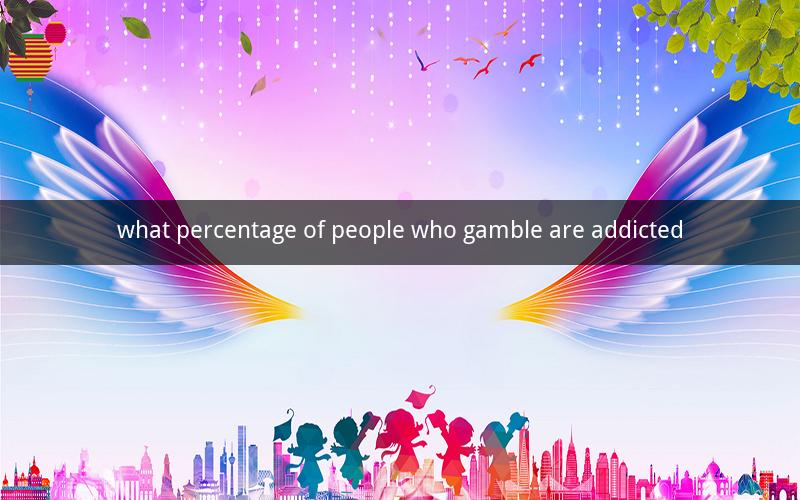
Table of Contents
1. Introduction
2. Understanding Gambling Addiction
3. Factors Contributing to Gambling Addiction
4. Identifying Problem Gamblers
5. The Prevalence of Gambling Addiction
6. The Impact of Gambling Addiction on Individuals and Society
7. Prevention and Treatment
8. Conclusion
1. Introduction
Gambling has been a popular pastime for centuries, captivating individuals from all walks of life. However, for some, the thrill of gambling can turn into an addiction, leading to serious consequences. One of the most pressing questions surrounding gambling addiction is: What percentage of people who gamble are addicted? This article delves into the prevalence of gambling addiction, its causes, and the available treatments.
2. Understanding Gambling Addiction
Gambling addiction, also known as problem gambling or compulsive gambling, is characterized by an uncontrollable urge to gamble, despite the negative consequences it may have on an individual's life. This addiction can affect people of all ages, genders, and socioeconomic backgrounds.
3. Factors Contributing to Gambling Addiction
Several factors can contribute to the development of gambling addiction. These include:
- Genetic predisposition: Research suggests that genetics play a role in determining an individual's susceptibility to gambling addiction.
- Environmental factors: Exposure to gambling opportunities, such as casinos or online gambling sites, can increase the likelihood of developing an addiction.
- Psychological factors: Individuals with certain personality traits, such as impulsive behavior or low self-esteem, may be more prone to developing a gambling addiction.
- Social factors: Peer pressure, family history of addiction, and stress can also contribute to the development of gambling addiction.
4. Identifying Problem Gamblers
Identifying problem gamblers can be challenging, as many individuals may not recognize their addiction or seek help. However, there are several signs that may indicate a gambling problem:
- Increasing time spent gambling
- Borrowing money to fund gambling activities
- Lying to family and friends about gambling habits
- Neglecting responsibilities due to gambling
- Experiencing negative emotions, such as guilt, anxiety, or depression, after gambling
5. The Prevalence of Gambling Addiction
The prevalence of gambling addiction varies across different regions and demographics. However, according to the National Council on Problem Gambling, approximately 2-3% of the adult population in the United States is affected by gambling addiction. This translates to around 6 million people.
6. The Impact of Gambling Addiction on Individuals and Society
Gambling addiction can have severe consequences for both individuals and society. Some of the impacts include:
- Financial problems: Individuals with gambling addiction may experience significant debt, foreclosures, and bankruptcy.
- Mental health issues: Problem gamblers are more likely to develop mental health conditions, such as depression, anxiety, and substance abuse disorders.
- Relationship problems: Gambling addiction can strain relationships with family, friends, and partners.
- Work-related issues: Individuals with gambling addiction may experience job loss, decreased productivity, and increased absenteeism.
7. Prevention and Treatment
Preventing and treating gambling addiction involves a multifaceted approach. Some of the strategies include:
- Education: Providing individuals with information about the risks and consequences of gambling can help prevent addiction.
- Self-help resources: Encouraging individuals to seek support from self-help groups, such as Gamblers Anonymous, can be beneficial.
- Professional treatment: Individuals with gambling addiction may benefit from therapy, medication, and support groups.
- Policy changes: Implementing policies that limit access to gambling opportunities, such as stricter regulations on online gambling, can help reduce the prevalence of addiction.
8. Conclusion
Gambling addiction is a serious issue that affects millions of people worldwide. While the exact percentage of individuals who are addicted to gambling is not known, it is clear that the problem is widespread. By understanding the factors contributing to gambling addiction and the available treatments, individuals and society can work together to address this pressing issue.
Questions and Answers:
1. What is the difference between social gambling and problem gambling?
Social gambling refers to occasional, recreational gambling with friends or family, whereas problem gambling involves an uncontrollable urge to gamble, despite negative consequences.
2. Can genetics play a role in gambling addiction?
Yes, research suggests that genetics may contribute to an individual's susceptibility to gambling addiction.
3. How can I recognize if someone I know has a gambling problem?
Signs of a gambling problem include increasing time spent gambling, borrowing money to fund gambling activities, and lying about gambling habits.
4. What are some effective treatments for gambling addiction?
Effective treatments for gambling addiction include therapy, medication, support groups, and self-help resources.
5. Can online gambling contribute to addiction?
Yes, online gambling can be a significant factor in the development of gambling addiction, as it provides easy access to gambling opportunities.
6. Is there a cure for gambling addiction?
While there is no definitive cure for gambling addiction, effective treatment and support can help individuals manage their addiction and lead a fulfilling life.
7. How can I help someone with a gambling problem?
You can help by offering support, encouraging them to seek professional help, and being understanding of their struggles.
8. What is the role of peer pressure in gambling addiction?
Peer pressure can contribute to the development of gambling addiction by encouraging individuals to engage in risky gambling behaviors.
9. Can stress contribute to the development of gambling addiction?
Yes, stress can contribute to the development of gambling addiction, as individuals may turn to gambling as a coping mechanism.
10. Are there any support groups available for individuals with gambling addiction?
Yes, there are several support groups available, such as Gamblers Anonymous, which offer support and resources for individuals struggling with gambling addiction.